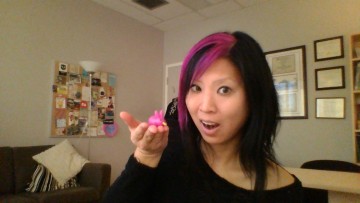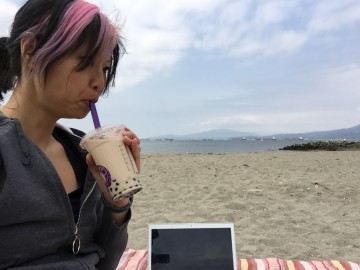
AMORI YEE MIKAMI, PHD (she/her)
I am an Professor in the Department of Psychology at the University of British Columbia, a Canada Research Chair, and a registered (licensed) clinical psychologist in the province of British Columbia. In my department, I am also the Associate Head for Equity, Diversity, and Inclusion.
I grew up in Los Angeles County in California (United States). I stayed in California for the rest of my education and training: Stanford University (1994-1998; B.A and M.A., psychology), University of California at Berkeley (1998-2004; PhD, clinical psychology), and University of California at San Francisco (2003-2005; clinical child psychology internship and postdoctoral fellowship). My first academic job was at the University of Virginia from 2005-2011, before I came here to University of British Columbia in 2011. I now have dual citizenship in Canada and the United States.
Growing up I moved a lot between birth and age 18 (although always around Los Angeles county) and I saw firsthand the dramatic variability in school and neighborhood social norms. Some behaviors that would lead to peer group acceptance in one location would fail in another location. Certain peer groups were more cliquish than others. Furthermore, teachers had quite diverse approaches to welcoming a new child into their classrooms. These experiences motivated my research interests about social relationships and social problems in youth, and what can be done to facilitate a more inclusive social environment. I apply an equity, diversity, and inclusion perspective to my research.
Many conceptual models of why children and adolescents have social problems tend to neglect contextual influences on peer relationships such as peer group norms and the inclusiveness of the peer group, instead predominantly focusing on behaviors on the part of the disliked youth that account for their rejection. In other words, the focus is on the individual level, as opposed to acknowledging structural barriers to inclusion. I seek to expand existing models to include social contextual factors that affect whether a peer group chooses to like (or dislike) someone. I’m also interested in reasons why in some peer groups, once a youth gets a negative reputation it is very difficult to shake whereas in other peer groups, reputations are more flexible. I have a particular interest in the population of youth with attention-deficit/hyperactivity disorder (ADHD) because this is a common condition, and many people with ADHD face social rejection. In addition, many children and adults have stigma around ADHD.

I also research strategies that parents and teachers can enact to help peer groups be more welcoming to others, particularly to others who are different from them. Some of this work has examined ways to bolster peers’ social inclusiveness of classmates who have ADHD. Our lab has developed various intervention programs for children with ADHD as a result of this research. Although, I also think of social inclusivity more broadly. For instance, some of our work has looked at barriers to cross-racial friendships in youth, and how these barriers might be overcome.
In this day and age, social interactions (and social problems) among adolescents and emerging adults occur just as often on digital media as they do in person. Youth with ADHD are having social experiences online just like everyone else, and these social experiences are meaningful to them. One question our lab has studied is how are online interactions and peer relationships similar versus different from those that occur face to face, and what are the consequences for adjustment? For the first time, our lab is testing out different online intervention strategies with the hope of improving users’ mood, wellbeing, and social connectedness on social media. Given how much the digital world seems to be entrenched in our social communication, we are excited to learn more about how to navigate this world effectively.
Another way in which I also think about inclusivity relates to structural and systemic barriers to mental health services, and the cultural competence of service providers. The greater Vancouver area also has a high representation of people from pan-Asian backgrounds. However, there is evidence that mental health needs in this group are under-recognized and under-served by providers currently. Although Asian Canadians are not the only equity-deserving group nor the only group facing a services gap, we have chosen to focus on them at this time because of the expertise of the research team. For this reason, our lab is starting a new study that explores perceptions about ADHD and treatment-seeking among Asian Canadian families of children with ADHD. We are also running a study to examine daily experiences of stress and ADHD symptoms, and how this may relate to Asian Canadian cultural background, among UBC students.
My personal life is a wondrous mix of curiosity about research pursuits, adventures in innovative eating and drinking, teaching choreographed step aerobics classes every weekend that involve a disproportionate amount of 80s and 90s pop music, and running races in a chicken costume.
I feel blessed and lucky to live in beautiful Vancouver.
Read more about my activities below!